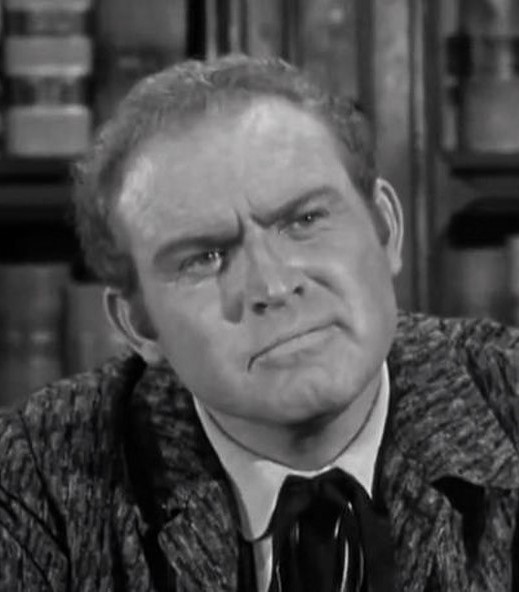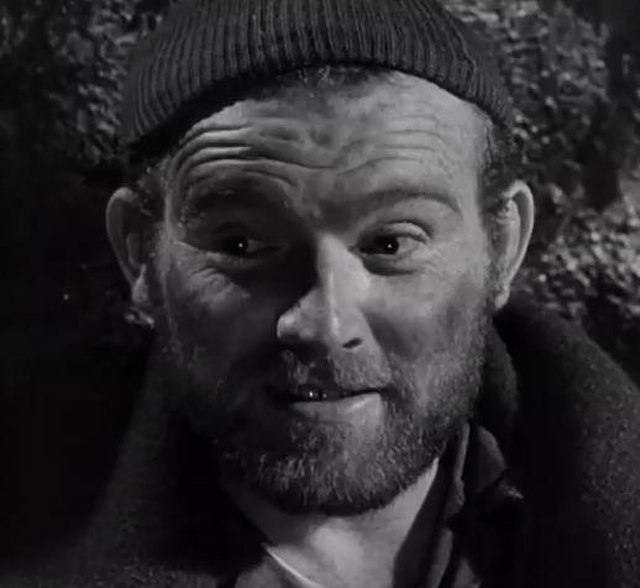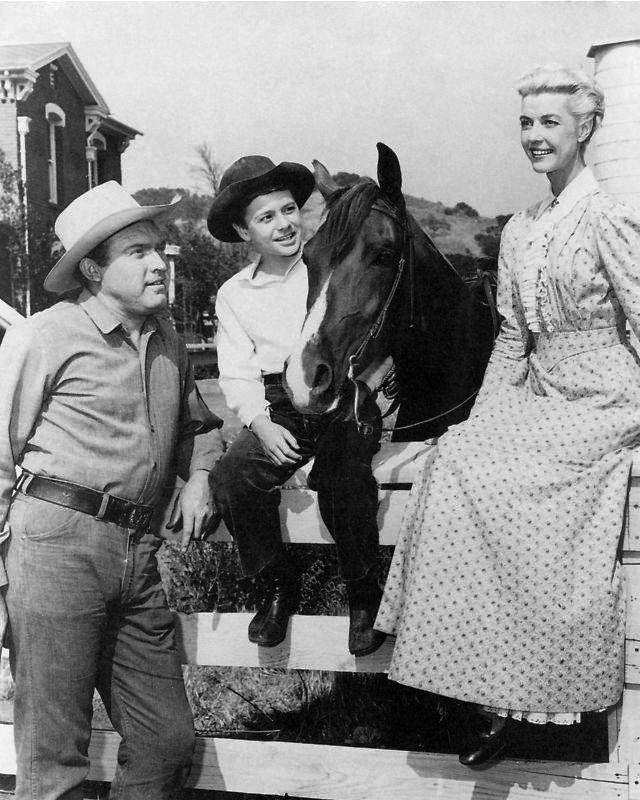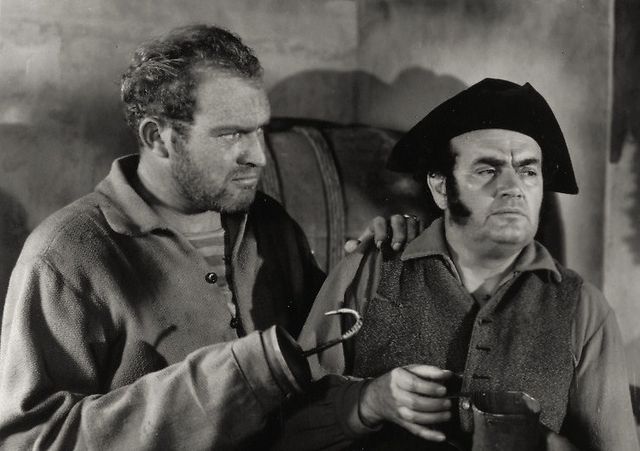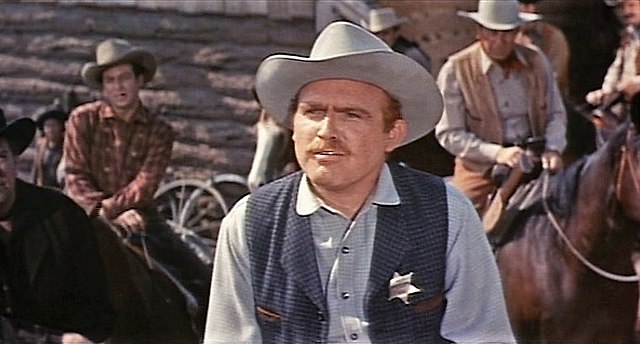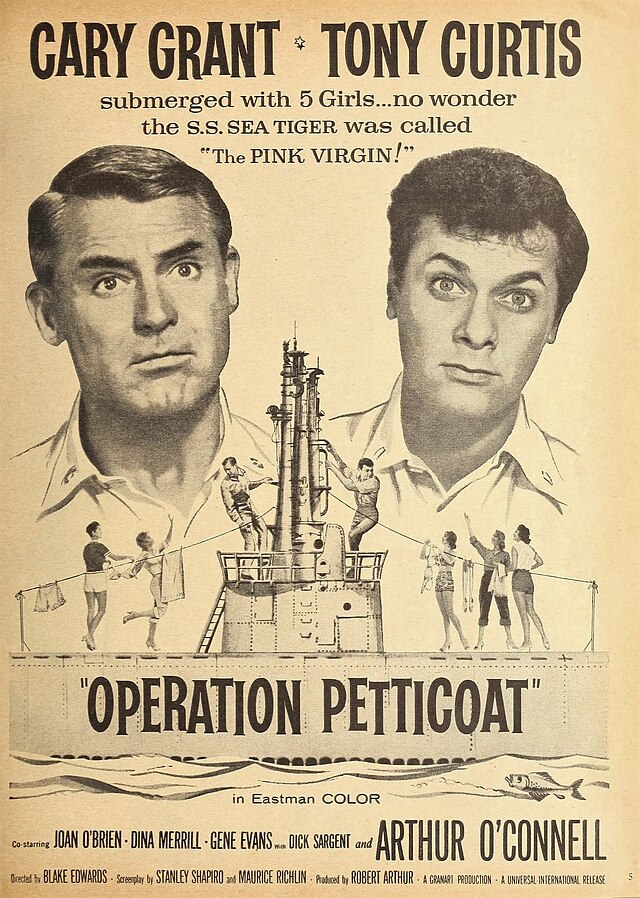Gene Evans
back| Full Name | Eugene Barton Evans |
| Stage Name | Gene Evans |
| Born | July 11, 1922 |
| Birthplace | Holbrook, Arizona, USA |
| Died | April 1, 1998 |
| Buried | Ashes scattered, no known specific burial site |
| Married to | Patricia Ann Willis (1956 – divorced) - Mary Elaine Hert (1968 – 1971, her death) |
| Children | one son, Bart Evans, and one daughter, Sue Evans |
| Notable films | The Steel Helmet (1951) - Fixed Bayonets! (1951) - Operation Patticoat (1959) - Walking Tall (1973) - Park Row (1952) |
Gene Evans
The Rugged Realist
Gene Evans (1922–1998) was a rugged American actor best known for his roles in war films and Westerns.
Born in Holbrook, Arizona, and raised in California, Evans served as a combat engineer in World War II, earning the Purple Heart and Bronze Star. His military experience deeply influenced his career, bringing authenticity to his portrayal of tough, battle-hardened characters.
He gained recognition in Samuel Fuller's The Steel Helmet (1951), which established him as a strong character actor.
Related
Gene Evans (1922 – 1998)
Biography and Movie Career
Gene Evans was an American actor whose rugged persona and commanding presence made him a standout in Westerns and war films. Below is a comprehensive biography that covers his early life, rise to fame, personal life, and eventual death.
Early Years and Military Service
Gene Evans was born Eugene Barton Evans on July 11, 1922, in Holbrook, Arizona, but he grew up in Colton, California. His upbringing in the rugged American West would later lend an authentic edge to his performances in Western films. Before Hollywood, Evans served his country in World War II as a combat engineer in the U.S. Army. His bravery in action earned him the Purple Heart and the Bronze Star.
Path Towards Success
Evans' acting career began after the war, when he participated in theater productions while stationed in Europe. When he returned to the U.S., he decided to pursue acting full-time. He moved to Hollywood in the late 1940s, making his film debut in 1947 with "Under Colorado Skies".
His breakthrough role came in 1951 when he was cast in "The Steel Helmet", directed by Samuel Fuller. Evans played Sgt. Zack, a gruff yet deeply human soldier, and the film was one of the first to depict the Korean War. His performance garnered critical acclaim and opened doors for him, particularly in the war film genre. He followed this with a strong performance in another Fuller-directed film, "Fixed Bayonets!", further cementing his reputation as an actor who excelled in tough, military roles.
Evans would continue to work with Fuller throughout his career, appearing in "Shock Corridor" (1963) and several other films. His rugged features and ability to embody tough, no-nonsense characters made him a staple of 1950s and 1960s cinema, particularly in Westerns like "The War Wagon" (1967), "Cattle Queen of Montana" (1954), and the war epic "Hell and High Water" (1954).
Personal Life and Marriages
Evans' personal life was much quieter than the bold, larger-than-life characters he portrayed on screen. He was married twice during his lifetime. His first marriage was to Patricia Ann Willis in 1956, though the details of their relationship and eventual divorce remain private. His second marriage was to Mary Elaine Hert in 1968. Tragically, Mary Elaine passed away on April 23, 1971, just three years after their marriage. Evans did not remarry after her death, and there is no record of him having any children.
Passions and Life Beyond Acting
Though primarily known for his acting, Evans had a passion for the military, stemming from his World War II service. His on-screen persona was deeply influenced by his own military experience, and it became a hallmark of his career. His rugged individualism and authenticity made him a favorite among directors looking for realism in their films, particularly in Westerns and war dramas.
Evans was also passionate about the craft of acting, though he rarely sought the limelight in his personal life. He remained a working actor throughout the 1950s, 60s, and 70s, often portraying strong authority figures like sheriffs, sergeants, and deputies. His performances were always marked by his intense presence and gravelly voice, which added depth to his characters.
Final Years and Death
Evans continued to act well into the 1980s, appearing in both film and television roles. However, as Hollywood's golden age of Westerns and war films waned, his prominence began to fade. He retired from acting in the early 1990s.
Gene Evans passed away on April 1, 1998, in Jackson, Tennessee, at the age of 75. The official cause of death was heart failure. His ashes were reportedly scattered, and there is no known grave or burial site(
Legacy
Gene Evans' career spanned five decades, and his work remains a vital part of Hollywood's rich history of war films and Westerns. Though never a major star in the traditional sense, his authenticity and consistency as a character actor made him a respected figure in the industry. His performances in films like "The Steel Helmet" and "Fixed Bayonets!" are considered classics of the genre, and his collaborations with Samuel Fuller left a lasting impact on American cinema.
Evans is remembered for his dedication to his craft and for the genuine toughness he brought to his roles. For many fans of classic cinema, Gene Evans will always be the archetype of the grizzled, battle-hardened sergeant or the tough Western gunslinger.
Gene Evans Tribute
Rugged Acting Style of Gene Evans
Gene Evans’ acting style was defined by his rugged authenticity, no-nonsense demeanor, and ability to embody tough, gritty characters, particularly in war films and Westerns. His performances were marked by an understated yet intense realism, influenced by his personal experiences as a World War II veteran. This gave his portrayals of military men a genuine depth and believability.
Key Elements of His Acting Style:
- Naturalistic and Grounded: Evans excelled at portraying working-class, down-to-earth characters, often playing soldiers, lawmen, and authority figures. His performances were stripped of vanity, and he often brought a raw, unpolished quality to his roles. In films like The Steel Helmet and Fixed Bayonets!, Evans’ rugged appearance and gravelly voice contributed to the realism of his characters, making him stand out in roles that demanded believability over glamour.
- Tough but Vulnerable: While Evans typically played tough characters, he also conveyed a sense of underlying vulnerability and moral complexity. This is evident in his portrayal of Sergeant Zack in The Steel Helmet, where his gruff exterior masks a soldier deeply affected by the brutalities of war. His ability to blend toughness with moments of introspection gave his performances a humanizing dimension, particularly in war films where his characters often grappled with trauma and survival.
- Physical Presence: Standing at 6'1½", Evans had a commanding physical presence that naturally lent itself to roles of authority. Whether playing a sheriff in Westerns like Cattle Queen of Montana or a sergeant in war dramas, his physicality added to his credibility in roles that required leadership and strength. However, despite his imposing frame, Evans was never overly theatrical; instead, he preferred a restrained approach that emphasized the gravity of his characters.
- Samuel Fuller Collaborations: Evans' collaborations with director Samuel Fuller further shaped his style. Fuller, known for his hard-hitting, realistic films, often cast Evans in roles that emphasized the gritty, uncompromising aspects of war and human nature. In these films, Evans brought a steely intensity to his characters, whether it was a battle-hardened soldier or a mentally unhinged patient, as seen in Shock Corridor.
- Subtle Emotional Range: While Evans was primarily known for his gruff, tough roles, he was capable of subtle emotional depth. In films like Donovan’s Brain, where he played a scientist, he was able to soften his typical roughness, showing a more intellectual and compassionate side to his characters. His ability to shift between brute force and nuanced emotion made him a versatile actor, despite often being typecast in tough-guy roles.
Legacy and Impact:
Gene Evans’ acting style remains influential in how Hollywood depicted war heroes and Western lawmen in the mid-20th century. His commitment to realism and refusal to over-dramatize his performances gave his characters an authenticity that resonated with audiences, particularly veterans who could relate to the grounded nature of his military roles. His style set a standard for portraying rugged masculinity in a way that was relatable, rather than idealized.
In summary, Gene Evans’ acting was defined by his rugged authenticity, physical presence, and ability to convey both toughness and vulnerability. His naturalistic approach, honed through personal experience and collaborations with directors like Samuel Fuller, made him a distinctive figure in American cinema.
Recognition for Gene Evans
Gene Evans was primarily known for his contributions to cinema, particularly in war films and Westerns, but his career did not result in any major individual awards from prominent industry bodies like the Academy Awards, Golden Globes, or Emmy Awards.
Notable Recognition
- Critical Acclaim for "The Steel Helmet" (1951): While Evans himself did not receive an individual award for this film, his portrayal of Sergeant Zack in The Steel Helmet was widely praised. This film, directed by Samuel Fuller, is often regarded as one of the most authentic and groundbreaking war movies of its time. Evans’ performance helped establish him as a serious actor in Hollywood, and the film remains a significant part of his legacy.
- Collaborations with Samuel Fuller: Evans’ collaborations with Fuller in films like Fixed Bayonets! (1951) and Shock Corridor (1963) garnered critical attention. Though Evans himself wasn’t awarded, his association with these films helped solidify his standing in the industry as a reliable and impactful character actor.
- Long-Lasting Legacy in Genre Films: Although Evans did not receive formal awards, his work in Westerns and war films has been appreciated within these genres. His films like Cattle Queen of Montana and Walking Tall were successful in their time and remain popular with fans of classic cinema, giving him a sort of posthumous recognition among genre enthusiasts.
Military Honors:
Apart from his film career, it’s worth noting that Gene Evans was a decorated World War II veteran. He was awarded the Bronze Star and the Purple Heart for bravery in action during his military service, which influenced his film roles and the authenticity he brought to his performances
Quotes from Gene Evans:
- On his approach to acting and being cast in tough-guy roles:
“I think I was born to play those kinds of parts. I had the look, I had the military experience, and I never minded getting a little dirty in the roles. It felt real.”
- On his work with Samuel Fuller:
Evans frequently credited director Samuel Fuller with shaping his acting career, especially for The Steel Helmet: “Sam knew how to bring the best out of me. He was never one for doing things the easy way, and I guess that’s why we got along so well. He expected authenticity, and I gave him that.”
- On the authenticity of war films:
Reflecting on his personal military experience and his war film roles, Evans said: “You can’t fake that kind of pain or fear. You can try, but it won’t ring true. Having been through it, I think that made a difference in my performances.”
- On Hollywood and fame:
Evans wasn’t drawn to Hollywood glamour: “I came to do the work. The fame part never interested me. I’d rather be remembered for being good at what I did than for being in the headlines.”
Movies with Gene Evans
1940s:
- 1947 - "Under Colorado Skies": A musical Western where Evans had a small part as Henchman Red, marking his film debut.
- 1948 - "Larceny" (Uncredited): A crime film where Evans appeared briefly as Horace.
- 1949 - "Criss Cross" (Uncredited): A noir classic about a love triangle and a robbery, where Evans played a small role.
- 1949 - "Mother is a Freshman" (Uncredited): A romantic comedy where Evans had a bit part.
- 1949 - "It Happens Every Spring" (Uncredited): A baseball comedy featuring Evans as a minor character, Batter Mueller.
1950s:
- 1950 - "The Asphalt Jungle" (Uncredited): A landmark heist movie directed by John Huston. Evans played a policeman.
- 1950 - "Armored Car Robbery": A noir film about a heist gone wrong, where Evans portrayed William 'Ace' Foster.
- 1951 - "The Steel Helmet": Directed by Samuel Fuller, this was Evans’ breakout role as Sgt. Zack in one of the first Korean War films, which was praised for its realism and strong performances.
- 1951 - "Fixed Bayonets!": Another war drama directed by Fuller, where Evans played Sgt. Rock in a gripping tale about a small platoon in the Korean War.
- 1951 - "Ace in the Hole": A Billy Wilder film about media sensationalism, where Evans played a deputy sheriff.
- 1952 - "Park Row": Directed by Samuel Fuller, Evans stars as Phineas Mitchell, a passionate journalist in the 1880s who struggles to establish an independent newspaper.
- 1952 - "Thunderbirds": Evans plays Sgt. Mike Braggart in this romantic war drama about Native American soldiers during World War II.
- 1953 - "Donovan's Brain": A sci-fi horror film where Evans portrays Dr. Frank Schratt, a scientist involved in an experiment on a disembodied brain.
- 1954 - "Cattle Queen of Montana": A Western where Evans co-starred with Barbara Stanwyck as Tom McCord, in a story about homesteaders fighting cattle barons.
- 1959 - "The Giant Behemoth": A British-American monster film where Evans played Steve Karnes, a scientist investigating a prehistoric creature terrorizing England.
1960s:
- 1961 - "Gold of the Seven Saints": Evans plays McCracken in this Western adventure film about two men who strike it rich, only to face dangers from outlaws and the environment.
- 1963 - "Shock Corridor": A film by Samuel Fuller where Evans played Boden, a patient in a psychiatric hospital, as a journalist infiltrates the institution to solve a murder.
- 1967 - "The War Wagon": A Western where Evans played Deputy Hoag alongside John Wayne and Kirk Douglas, about a plan to hijack a gold shipment.
1970s:
- 1970 - "The Ballad of Cable Hogue": Directed by Sam Peckinpah, Evans played Clete in this offbeat Western about a man seeking revenge on his former partners.
- 1973 - "Walking Tall": Evans played Sheriff Al Thurman in this biographical crime drama about a man who cleans up corruption in his hometown.
- 1973 - "Pat Garrett and Billy the Kid": Evans appeared as Mr. Horrell in this Sam Peckinpah-directed Western about the pursuit of outlaw Billy the Kid.
1980s:
- 1982 - "The Shadow Riders": A Western TV movie where Evans played Colonel Holiday Hammond, as two brothers try to rescue their kidnapped siblings after the Civil War.
1990s:
- 1998 - "Split": Evans played an evangelist in one of his final films, a sci-fi film about futuristic surveillance and control.

